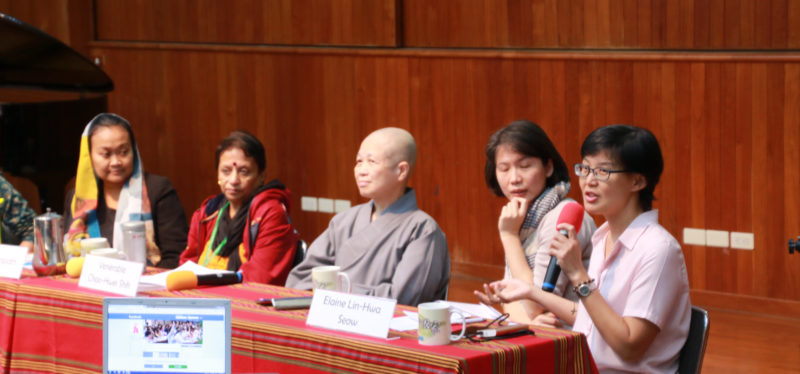Interfaith women representatives discuss spirituality and wholeness of life
 Panel presentation on 'Towards Nurturing Spirituality and Wholeness of Life'
Panel presentation on 'Towards Nurturing Spirituality and Wholeness of Life'
HSINCHU, Taiwan: Women representatives from Asia’s four major faiths – Islam, Buddhism, Hinduism, and Christianity – affirmed the necessity of spiritual care for the wholeness of life on the second day of the Asian Ecumenical Women’s Assembly (AEWA).
In a special panel presentation focusing on ‘Towards Nurturing Spirituality and Wholeness of Life’, the four panellists drew from the ethos and values of their respective religious traditions and expressed valuable insights.
Dr Dewi Candraningrum, an Islamic theological scholar, shared her reflections as a feminist Muslim woman. “Feminist spirituality,” she shared, “is a grassroots religious movement inside and outside established religion that reclaims power, value, and dignity of women who strive for equality. It is a commitment to bringing about in oneself and in the world an alternative vision of justice and equality for all.”
Dr Dewi explained that a personal spiritual quest is empowering, love-centred, and lies at the heart of human transformation.
According to Dewi, it is personal transformation that helps in healing collective trauma, and she stated this in the context of expressing solidarity with sexually enslaved Indonesian women, who, through art, attempt to make peace with the perpetrators. An inward spiritual transformation was a means of reclaiming one’s identity.
Sr Elaine Seow, a Roman Catholic nun from Verbum Dei, shared her insights in a series of delightful anecdotes. “The impulse to nurture one’s spirituality stems from the human existential need for ‘something more’, from the longing for something transcendental. In this process, the transformation of the self leads to the transformation of the community.”
Sr Elaine noted that reconciliation, renewal, and restoration were stages in achieving higher levels of spirituality, with each stage necessitating one to courageously allow more of God’s love to transform oneself. It is in this manner that one feels ultimately fulfilled.
Dr Ranjini Sampath, a Hindu spiritual practitioner and human rights activist, defined spirituality as the state or quality of being concerned with one’s human spirit or soul as opposed to material or physical things.
“The hallmark of a spiritual person is someone whose highest priority is to be loving to the self and others. A spiritual person cares not just for fellow human beings, but for the whole creation. A spiritual person knows that we are all one, and consciously attempts to honour this oneness,” she said.
Dr Ranjini explained that spirituality was to be nurtured and cared for such that an unbreakable bond is formed between the heart and the mind. Once an internal harmony is secured, one can then extend compassion and care to the rest of creation.
Venerable Shih Chao-hwei, a Taiwanese Buddhist nun, talked about the Buddhist idea of spirituality. According to Buddhism, the aim of nurturing spirituality was to eliminate suffering and attain happiness.
Venerable Chao-hwei spoke highly of objectivity and detachment as necessary tools in securing the wholeness of life. Though paradoxical, she explained that ‘meditation offered the perfect space for demonstrating objectivity and detachment coupled with an extremely high sense of perception and self-awareness’.
Chao-hwei said to the participants, “Meditating on the idea of loving kindness is to open channels of one mind with deep observations, to go beyond yourself, and to get through the barrier that lies between yourselves and others, to share your happiness with the whole of creation.”
Ruth Mathen from the CCA moderated the session and summarised the insights of the panellists. She said, “It is the Word of God that provides our spiritual nourishment in different ways, and such nourishment is imperative in securing one’s sense of self in order to effectively care for our communities and for creation at large.”










